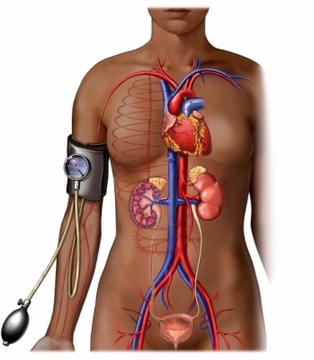Arterial hypertension – High blood pressure
Description hypertension
Arterial hypertension – abnormally high blood pressure for no apparent reason. Blood pressure measurement is performed for the two indicators:
- Systolic pressure – greater number, the normal value is 120 millimeters of mercury (mmHg.) or less;
- Diastolic pressure – fewer, the normal value is 80 mm or less.
High blood pressure is defined as systolic pressure greater than 140 mmHg. and / or diastolic blood pressure is above 90 mm Hg. Pregipertenziya diagnosed, if the systolic blood pressure is within 120-139 mmHg., or the diastolic pressure is within 80 – 89 mm Hg. Your doctor will recommend monitoring pressure and lifestyle change.
High blood pressure is the workload on the heart, lungs, brain, kidney and blood vessels. Over time, this condition can lead to damage of these organs and tissues.

Causes of Hypertension
The cause of essential hypertension is not known.
Risk factors for hypertension
These factors increase the likelihood of developing high blood pressure. Tell your doctor, if you have any of these risk factors:
- Paul:
- Male;
- Women after menopause;
- Age: middle-aged and older;
- Overweight;
- Alcohol consumption;
- Smoking;
- The use of oral contraceptives (birth control pills);
- Passive lifestyle;
- A family history of hypertension;
- Kidney disease;
- Diabetes;
- Consumption of foods high in fat, salt;
- Stress.
Symptoms of hypertension
High blood pressure usually causes no symptoms. But an abnormal pressure can damage tissue and organs.
Sometimes, if blood pressure reaches extreme levels, may occur following:
- Headache;
- Blurry or double vision;
- Abdominal pain;
- Chest pain;
- Breathlessness;
- Dizziness.
Diagnosis of hypertension
High blood pressure is often diagnosed during a visit to the doctor. Blood Pressure Measurement It is carried out using a cuff for hands and a special device. If the pressure is high, should be regularly re-measure it. If within three readings were more visits 140/90 mmHg, It will be diagnosed with high blood pressure.
Your doctor may order tests, To make sure, that high blood pressure is not caused by another disease. You also need to make sure, high blood pressure does not cause any problems.
Tests include:
- Blood tests;
- Urine;
- Chest X-ray – test, which uses X-rays, to take a picture of structures inside the body;
- Electrocardiogram (ECG) – test, that records heart activity by measuring electrical current through the heart muscle.
Treatment of hypertension
Lifestyle changes
- Maintain a healthy weight;
- Perform the exercise with the advice of a doctor;
- If you smoke, you need to quit smoking;
- Eat a healthy diet low in fat, salt and rich in fiber; fruits and vegetables. Your doctor may recommend a diet DASH, designed to lower blood pressure;
- Drink alcohol in moderation (no more 80 grams per day for men, 40 grams per day for women);
- Avoid stress.
Drugs for hypertension
These include:
- Diuretic;
- Beta Blockers;
- Angiotensin-converting enzyme (ACE inhibitors);
- Calcium channel blockers;
- Angiotensin receptor blockers;
- Aldosterone blockers;
- Alpha-blockers;
- Alpha-beta-blockers;
- Inhibitors of the nervous system;
- Vasodilators.
Attention: Untreated high blood pressure can cause:
- Heart Disease;
- Heart attack;
- Stroke;
- Renal;
If diagnosed with high blood pressure, you need to follow your doctor's instructions.
Preventing Hypertension
To reduce the risk of high blood pressure, Use the following guidelines:
- Eat a well-balanced diet. The DASH diet, rich in fruits, vegetables, dairy products with low fat, and foods low in saturated fat and cholesterol can help maintain blood pressure in the normal range;
- Exercise regularly;
- Maintain a healthy weight. Body mass index should be lower than 25;
- If you smoke, you need to quit smoking;
- Drink alcohol in moderation (no more 80 grams per day for men, 40 grams per day for women).
